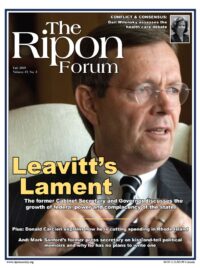 One of the most significant statistics in the debate on health care reform is this: half of the money we spend on health care is spent on just five percent of the people.
One of the most significant statistics in the debate on health care reform is this: half of the money we spend on health care is spent on just five percent of the people.
Basically, these are people who eat too much, exercise too little, and smoke. They develop expensive and largely preventable conditions: high blood pressure, heart disease, diabetes, and many types of cancers.
This is evidence of the role of personal responsibility in controlling the cost of care. If we can provide the proper incentives to encourage people to live healthier lives, there will be adequate money to help others deal with the cost of their care.
As a practicing physician, I’ve been fascinated to see how little Medicare will pay for a doctor or nurse to spend time teaching a diabetic how to control blood sugar. Medicare pays much more to treat the complications when a diabetic’s condition becomes uncontrolled.
If we can provide the proper incentives to encourage people to live healthier lives, there will be adequate money to help others deal with the cost of their care.
As the medical director of the Wyoming Health Fairs, I annually supervised the blood testing of over 50,000 Wyoming family members for over two decades. These inexpensive blood screening exams test for cholesterol, diabetes, anemia, thyroid problems, prostate cancer and much more. With the help of these programs, people have taken charge of their own health.
Amazingly, Medicare still refuses to pay for these low cost exams. Medicare routinely pays much higher prices for individual blood tests if a patient has symptoms. Medicare refuses to cover screening tests to help our seniors identify problems early. The state of Wyoming will pay for the screening exams for its employees because it recognizes the value of early detection and prevention. Washington, D.C. does not.
Businesses that want to set up workplace programs designed to motivate their employees to adopt healthy habits face a maze of government obstacles and regulations. They have to contend with the Health Insurance Portability and Accountability Act, the Americans with Disabilities Act, the Employee Retirement Income Security Act and numerous other rules that make it difficult for them to create effective incentives.
The Democrat health care reform bills do nothing to improve the situation. While they pay lip service to prevention, they target the money toward things like bike trails, street lights and jungle gyms. These do very little to motivate the individual.
We can do better. Real health care reform must be patient-centered. The way to reduce costs and improve the health of our citizens is by creating true incentives for people to take responsibility for their own health.
The different approaches to helping others stay healthy illustrate the difference between how conservatives and liberals view this issue.
I start with the assumption that people generally can be trusted to do the right thing and society prospers when government has less to say about how people run their lives. Others start by assuming that Washington knows best and should take more authority over all of us.
I prefer individualized incentives that encourage healthy behavior. Regrettably, our current health care system is not built to emphasize wellness and prevention – nor do the reforms currently under discussion in Congress.
It is time to revise federal regulations so employers and insurers can more easily offer wellness programs that reward people who quit smoking, lose weight and control their cholesterol and blood pressure.
It is time to revise federal regulations so employers and insurers can more easily offer wellness programs that reward people who quit smoking, lose weight and control their cholesterol and blood pressure. That’s what was done by the grocery store chains Safeway and Whole Foods. They reduced their health care costs substantially. The rules should make it easier for all businesses to offer these kinds of voluntary programs.
Real reform means changing the Medicare payment system to pay providers for the time spent working with patients on personalized prevention and healthy living plans. Since Medicaid and other insurance programs base their payments on what Medicare allows, this would go a long way toward focusing doctors, physician assistants, nurse practitioners, dietitians and other health professionals on keeping patients healthy, instead of treating them once they become sick.
In many cases, and for many people, the best result of health care reform will not come from Washington. It will happen when government gives people the freedom to control their choices and truly take charge of their own health.
Democrats in Congress are planning an extremely expensive experiment that will affect the life of every American. They should be focusing on taking cost effective steps that will improve the health and the healthcare of our country.
–###–
John Barrasso is a U.S. Senator from the State of Wyoming. An orthopedic surgeon for over 24 years, he has served as President of the Wyoming Medical Society and has been recognized as Wyoming Physician of the Year.




